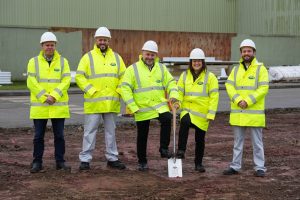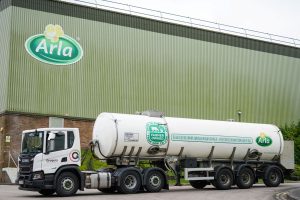Project will look at how farmed seaweed could turn the tide on ‘harmful’ fertiliser use

A firm farming seaweed to unlock its potential as a climate-positive, high-value crop have been awarded funding to research its use as a green alternative to conventional fertilisers.
Algapelago Marine, which describes itself as on a mission to develop a network of seaweed farms, secured a licence two years ago to farm kelp over a 120ha site in Bideford Bay, close to its base in Appledore, North Devon.
It is now proving the concept at the site ahead of scaling operations to supply high-quality cultivated kelp as a sustainable material for food, nutra and pharmaceuticals, cosmetics, bio-packaging and animal feed along with other applications.
Its latest project, its second funded by Innovate UK, will investigate whether seaweed can be used to improve nutrient use efficiency in arable and horticultural systems. It is already under way in collaboration with environmental research organisation The James Hutton Institute, Atlantic Mariculture – a similar business creating seaweed farms off the west coast of Scotland – and the UK Agri-Tech Centre.
The project, in response to the need for more efficient nutrient management in agriculture, is adopting a biological approach – valuing the importance of microbial and fungal communities in the breakdown, cycling and retention of nutrients in soil.
Because of their uniquely rich profile of fibres, micronutrients and bioactive components, seaweed supplements enhance the growth of specific microbiota in soil. This leads to a “cascade” of biological functions with beneficial impacts for productivity, resistance to abiotic stress and resistance to pathogens.
The UK Agri-Tech Centre said this approach was relevant across a wide range of crop types, including broadacre, horticulture and top fruit.
UK Agri-Tech Centre innovation lead for aquaculture Martin Sutcliffe said the UK seaweed farming sector had great potential to meet the needs of other sectors such as arable farming.
“Projects like this can provide real world use cases for seaweed farmers, enabling sustainable growth of seaweed farming in the UK which, in turn, can provide well-paid, long-term jobs in our coastal communities, helping to shift away from the current boom and bust cycle of seasonal employment,” he added.
Algapelago Marine head of operations Luke Ansell said: “The project aims to address data gaps and build the evidence case for the role of cultivated seaweed extracts in modern crop production.”
Atlantic Mariculture innovation manager Dr Adrian Macleod added: “Seaweed aquaculture is a game-changer for sustainable food systems and I’m passionate about unlocking its full potential.
“Cultivated seaweed biomass offers a scalable, sustainable solution that not only supports marine ecosystems but could also play a vital role in sustainable agriculture.
“This project is an exciting step forward in demonstrating how seaweed biostimulants can enhance soil health, improve nutrient efficiency and reduce reliance on conventional fertilisers.
“By developing an innovative supply chain, we are laying the groundwork for a future where cultivated seaweed is a cornerstone of both aquaculture and agriculture.”
Financial details of the funding have not been disclosed.









